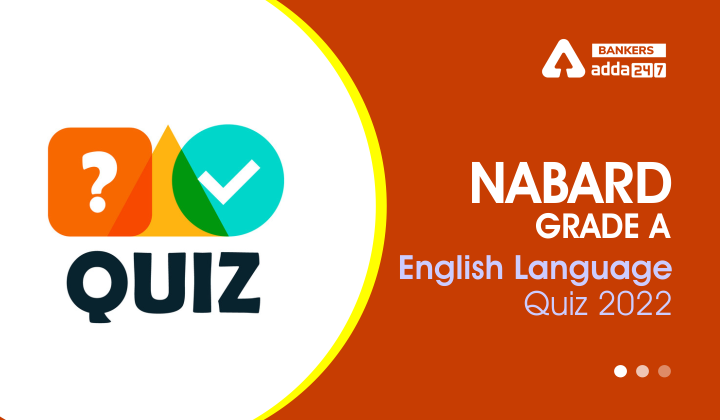Direction (1-5): In each of the following questions, a sentence is written in four different ways conveying the same meaning and following the correct grammar structure. Choose the sentence among the four options which is grammatically incorrect or carrying a grammatical/idiomatic error in it as the answer. If there is no error in any of the sentences, choose (e), i.e. “All are correct” as the answer.
Q1.
(a)When a person fails in his pursuits, there is no built-in support system to cushion the fall.
(b)There is no built-in support system to cushion the fall once a person fails in his pursuits.
(c)A person failing in his pursuits finds no built-in support system to cushion the fall.
(d)There is no built-in support system for cushion the fall for a person failing in his pursuits.
(e)All are correct.
Q2.
(a)Since the mid-1960s in several developed countries, there has been a rising tide of clinical depression and a decline in mutual trust and social bonds.
(b)A rising tide of clinical depression and a decline in mutual trust and social bonds have been witnessed since the mid-1960s in several developed countries.
(c)There has been a rising tide of clinical depression and a decline in mutual trust and social bonds in several developed countries in the mid-1960s.
(d)Several developed countries have been witnessing a rising tide of clinical depression and a plunge in mutual trust and social bonds since the mid-1960s.
(e)All are correct.
Q3.
(a)There is value in living a simple life, but a simple life is often misunderstood as renunciation.
(b)Though there is value in living a simple life, it is often confounded as renunciation.
(c)While there is value in living a simple life, it is often misapprehended as repudiation.
(d)A simple life is often confused as renunciation, even though there is value in living a simple life.
(e)All are correct.
Q4.
(a)There is freedom when we lose our need for abundance and live in sufficiency.
(b)To get freedom, we need to deprived of our need for abundance and live in sufficiency.
(c)When we get rid of our need for abundance and live in sufficiency, we get freedom.
(d)We attain freedom once we give in our need for abundance and live in sufficiency.
(e)All are correct.
Q5.
(a)One of the critical consequence of material excess and consumerism is the effect on moral and ethical values.
(b)One critical consequence of material excess and consumerism has been the effect on moral and ethical values.
(c)The effect on moral and ethical values has been one critical consequence of material excess and consumerism.
(d)There has been one critical consequence of material excess and consumerism i.e., the effect on moral and ethical values.
(e)All are correct.
Directions (6-12): In the following passage, some of the words have been left out, each of which is indicated by a number. Find the suitable word from the options given against each number and fill up the blanks with appropriate words to make the paragraph meaningfully complete.
India has a young population ___(6)__ a median age of 27.6 years. Therefore, unlike in most developed countries and China, problems of the elderly, of the kind discussed in a recent __(7)___ of ageing by the Economist, are not a hot-button public policy issue. But that would ___(8)___ the higher proportion of the elderly in the southern states and among __(9)___ sections elsewhere.
While the under-14s account for 28% of India’s population, about 66% are in the age group 15-65. That leaves 6% of the population who are 65-plus. The potential support ratio, the number of working age persons per senior citizen is thus 11, a far cry from Japan’s 2.1. But, while the problem lacks urgency, this is the right time to act. By __(10)____ the National Pension System’s architecture of funded pensions while the country is still young, India has chosen to avoid the problems that befall a pay-as-you-go system of pensions when the working population ____(11)____ in relation to that of the elderly who do not work. Similar prudential action is required in other _(12)____ fronts.
Q6.
(a) consisting
(b) with
(c) in
(d) contains
(e) have
Q7.
(a) reports
(b) opinion
(c) trial
(d) survey
(e) rating
Q8.
(a) negate
(b) abrogate
(c) despise
(d) ignore
(e) provoke
Q9.
(a) superfluous
(b) affluent
(c) auxiliary
(d) liberal
(e) extreme
Q10.
(a) commencing
(b) accomplishing
(c) effecting
(d) executing
(e) creating
Q11.
(a) shrinks
(b) mitigates
(c) undermines
(d) disables
(e) restrains
Q12.
(a) developing
(b) raising
(c) evolving
(d) ageing
(e) mollifying
Directions (13-15): In each question below a sentence with four words printed in bold type is given. These are numbered as (a), (b), (c) and (d). One of these four words printed in bold may be either wrongly spelt or inappropriate in the context of the sentence. Find out the word which is wrongly spelt or inappropriate if any. The number of that word is your answer. If all the words printed in bold are correctly spelt and also appropriate in the context of the sentence, mark (e) i.e. ‘All correct’ as your answer.
Q13. Under existing (a) / regulations we are not permitted (b) / to owe (c) / more than a forty percent share (d) / of the family business. All correct (e).
(a) existing
(b) permitted
(c) owe
(d) share
(e) All correct
Q14. In case of any land dispute (a) / panchayat officials (b) / will determine (c) / how the property is to be dividend (d) / All correct (e).
(a) dispute
(b) officials
(c) determine
(d) dividend
(e) All correct
Q15. The World Bank has consented (a) / to sanction (b) / the necessary (c) / finance (d) / for the project. All correct (e).
(a) consented
(b) sanction
(c) necessary
(d) finance
(e) All correct
Solutions
S1. Ans. (d)
Sol. All the sentences, except (d), are the grammatically correct sentences and they follow the similar meaning. However, in the sentence (d), there is a grammatical error. The phrase in the sentence (d), “for cushion the fall” should be replaced either by “to cushion the fall” or “for cushioning the fall” to make the sentence grammatically correct. The phrase “cushion the fall” means to soften or lessen the force or shock of. Hence (d) is the correct choice.
S2. Ans. (c)
Sol. There is a grammatical error in the sentence (c); the phrase “in the mid-1960s” should be replaced by “since the mid-1960s” as the sentence is in Present Perfect Continuous Tense. All the other sentences are grammatically correct and offer the common meaning. Hence (c) is the correct choice.
S3. Ans. (e)
Sol. All the given sentences are grammatically correct and at the same time they convey the same meaning. Thus (e) is the correct option.
S4. Ans. (b)
Sol. All the sentences, except (b), are grammatically correct and convey the same meaning. However, there is a grammatical error in the sentence (b); the phrase “we need to deprived of” should be replaced by “we need to be deprived of” to make the sentence grammatically correct. Hence (b) is the correct choice.
S5. Ans. (a)
Sol. The sentence (a) has a grammatical error; the phrase “One of the critical consequence” should be replaced by “One of the critical consequences” to make the sentence grammatically correct. It is to be noted that the noun following the phrase “one of the” is always a plural noun. All the other sentences are grammatically correct. Hence (a) is the correct choice.
S6. Ans. (b)
Sol. “with” is the correct preposition as it is used in the connection of having or possessing (something). If we go by the sentence structure, it can be sensed that the gap requires a preposition than a verb. Hence (b) is the correct option.
S7. Ans. (d)
Sol. “survey” is the correct word to fill the gap as it means an investigation of the opinions or experience of a group of people, based on a series of questions. Others words form the familiarity with it but are not in context of the meaning of the sentence. Hence (d) is the correct option.
S8. Ans. (d)
Sol. “ignore” is the most appropriate word in context of its meaning to the sentence as it means fail to consider (something significant). Hence (d) is the correct option.
S9. Ans. (b)
Sol. “affluent” is the correct word to fill the gap as it means (especially of a group or area) having a great deal of money; wealthy. Other words alter the meaning of the sentence. Hence (b) is the correct option.
S10. Ans. (e)
Sol. “creating the National Pension System’s architecture of funded pensions” makes the correct phrase in context of its meaning to the sentence. Hence (e) is the correct option.
S11. Ans. (a)
Sol. “shrinks” is the correct word as it means become or make smaller in size or amount. Other words are irrelevant in adding any meaning to the sentence.
S12. Ans. (d)
Sol. “ageing” is the correct word as it can be inferred after reading the complete passage. The theme of the paragraph revolves around the word which means (of a person) growing old; elderly. Hence (d) is the correct option.
S13. Ans.(e).
Sol. All the given words are correct.
S14. Ans.(d)
Sol. Use ‘divided’ instead of ‘dividend’.
S15. Ans.(a)
Sol. Use ‘agreed’ properly for ‘consented’.





 GA Capsule for SBI Clerk Mains 2025, Dow...
GA Capsule for SBI Clerk Mains 2025, Dow...
 The Hindu Review October 2022: Download ...
The Hindu Review October 2022: Download ...
 IBPS PO Apply Online 2025, Online Applic...
IBPS PO Apply Online 2025, Online Applic...


